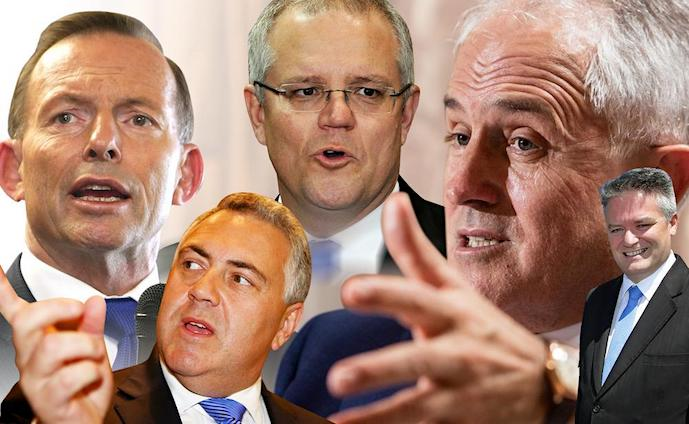
The sheer effrontery of our politicians never ceases to astonish me. To them black can be white, and in an instant white can be black. It is not just the monumental back flip that such a change of language involves that astonishes me, it is the bald-faced nerve they exhibit when they change course to the opposite direction, as if nothing had happened! The 2017 Budget starkly exemplifies this.
So burned into our neural networks are the slogans, the mantras, and the catchphrases of past eras that no change of heart, no change of language, no denial of history can ever erase them. Check your memory of the Abbott epoch to see if I’m right.
You will remember the Coalition’s sarcastic description of Labor’s economic team as being quite unsuited for the complex task of managing the economy during the Global Financial Crisis. It insisted they should stand aside and let the adults, the superior economic brains in the Coalition, the geniuses at economic management, take over. Labor’s team was depicted as kids playing games in a sandpit.
Let’s go back then to the time of the GFC, an emergency that threatened economies the world over.
You will remember that at that time the advice of Treasury Secretary Ken Henry to PM Kevin Rudd and Treasurer Wayne Swan was to provide economic stimulus, (which was plainly Keynesian) and to “go hard, go early, go households”.
They did, with cash handouts and infrastructure projects. The Rudd/Swan response was a spectacular policy success, tarnished only by poor implementation of the so-called ‘Pink Batts’ program by the Department of the Environment, during which the lives of four workers were tragically lost.
You will recall that while the Coalition supported the initial stimulus, although castigating the government for sending cheques overseas and to some deceased people, it reneged on supporting the second tranche – the bulk of the infrastructure stimulus. Prominent in that tranche was Julia Gillard’s ‘Building the Education Revolution’ that involved the construction of new and refurbished school halls, libraries and classrooms, science laboratories and language learning centres, covered outdoor learning areas, shade structures, sporting facilities and other environmental programs.
Infrastructure
You will remember the sarcasm that the Coalition heaped on these infrastructure projects, not only criticising elements of them, their suitability and their cost, but pouring contempt on the concept of infrastructure spending, which Tony Abbott and his Shadow Treasurer Joe Hockey deemed a waste of money. Malcolm Turnbull too chipped in with his two-penneth. Yet that infrastructure endeavour not only gifted thousands of schools with much-needed amenities and facilities, which now enhance them splendidly, but it also gave local builders work and hardware suppliers business. It kept many a small town going at a time when many businesses were threatened with closure, and many workers were facing unemployment.
Now, in 2017, suddenly Treasurer Scott Morrison tells us that spending on infrastructure is fine as it accumulates ‘Good Debt’. To confirm his newfound belief in the value of infrastructure spending, his Budget features a plethora of such projects: road, rail, airport, hydro, and energy infrastructure, many with timelines stretching into the distant future. While there will be debate about the merits of some and their timing, Labor is not condemning them as a waste of money, as it has always appreciated what Morrison has just awoken to, that infrastructure spending, especially when interest rates are low, is good for the economy.
Here then is the first example of how the Coalition’s economic geniuses, after all their previous scathing condemnation of infrastructure spending, have finally had the scales fall from their eyes, have seen its value, and have endorsed it extravagantly. But have they acknowledged their epiphany? Of course not!
Debt and deficit
Next, let’s reflect on the ‘debt and deficit disaster’. Remember how almost daily newspaper headlines trumpeted: ‘Labor’s financial mismanagement’, ‘Debt spiralling out of control’, ‘Budget in freefall’ and ‘Labor's debt time bomb’. There was even a truck doing the rounds with ‘Labor’s Debt’ festooned on placards.
Joe Hockey was sarcastically indignant about budget ‘blowouts’ and revenue shortfalls. He revelled in lampooning a mining tax that raised no revenue. He insisted that a Labor government would never achieve a budget surplus. “It was not in their DNA”, he asserted. But of course it
was in the Coalition’s DNA.
It knew what to do. But as we know it
didn’t. Year after year it showed it had no idea how to achieve a surplus! Now Morrison thinks he’s found the magic formula.

Scared of a downgrade by the rating agencies, Morrison’s magic formula for a surplus in the 2017 Budget curiously still includes a corporate tax cut for big businesses and multinationals, no longer costing $50 billion, but now $65 billion, still predicated on a mythical trickle down benefit for those at the bottom of the heap. Surprisingly, while he gives with one hand he takes away with the other by imposing a new tax on the five big banks, levied on various types of borrowing that banks use to fund their lending, including corporate bonds and large deposits. Good luck with that one!
Here is Alan Austin’s assessment of Rudd/Swan period in his October 2016 article in
Independent Australia: Australia’s debt mismanagement under Turnbull: It’s worse than you think. Over the entire period of the first Kevin Rudd Government, debt was added at the rate of $2.85 billion per month. This was required to deal with the early onset of the global meltdown. This rate of borrowing increased slightly through Julia Gillard’s term until the GFC was over in early 2013. Through her last eight months, the gross debt added each month averaged just $1.02 billion. For Labor’s entire duration, the monthly increase averaged $3.06 billion.
Then came the appalling maladministration of Tony Abbott, during which $4.75 billion was added each month, without any justification related to global conditions. This resulted from wasteful spending on a colossal scale and refusal to collect taxes from the rich.
Further on, Austin writes:
Malcolm Turnbull then successfully challenged Tony Abbott for the prime ministership primarily because Abbott had “... not been capable of providing the economic leadership our nation needs.”
So what happened thereafter? Did the new regime start to repay the debt, as it had been promising to do for years? Not at all! Further fresh debt was added in Turnbull’s early months at a rate just below Abbott’s figure. That has since blown out disastrously, with more than $8.5 billion borrowed per month over the first four months of this financial year. Turnbull’s total rate has been $4.78 billion per month.
Gross debt is now $450.79 billion. This is $173.4 billion higher than the $277.4 billion Labor left in September 2013, up 62.5%. Net debt has also risen alarmingly. We only have the figures until the end of August, but these reveal a rise of $15.9 billion just since June, up 5.35% in two months to $312.3 billion. This is $137.7 billion above Labor’s $174.6 billion legacy, up 78.9%.
This was written six months ago. The situation is even worse now. The adults, the economic geniuses, have produced the situation reflected in their latest Budget.
“We don’t have a revenue problem; only a spending one”: Morrison
For as good an analysis of the Budget as you could wish for, and a scathing assessment of Morrison’s mantra, do read Greg Jericho’s article in
The Guardian: Federal budget 2017: the 10 graphs you need to see: There was a revenue problem after all!
After nearly a decade of saying the problem was all on the spending side, the 2017-18 budget is where the Liberal party has finally admitted that there is a revenue problem.
The 2017-18 budget estimates that by 2020-21 the budget will be firmly back in surplus, and it does it mostly off the back of government revenue returning to the level it was during the surplus years of the Howard government.
In the 11 years prior to the GFC, when the budget was either in surplus or balance, government revenue averaged 25.1% of GDP. In the nine years since the GFC, the highest it has been is 23.4%, and this year it was just 23.1%.
To give some context, 2% of GDP is around $34bn, so it’s a fair gap. But that gap is about to be reduced.
The budget predicts that by 2019-20 government revenue will reach 25.1% of GDP and in the following year a very healthy 25.4%. The last time we saw revenue at that level was in 2005-06.
To get there the budget anticipates revenue growing over the next 4 years by around 4.4% in real terms. That growth was not uncommon during the mining boom years, but has been reached only once in the past nine years.
And what is the revenue that is growing? Income tax.
In other words – revenue was a problem after all! The economic geniuses were wrong, again.
Morrison has now predicted that the long-wished-for surplus will first appear in 2019/20, four years from now! Let’s see if this prediction, based on very optimistic assumptions, is any better than his other predictions.
There it is. For years, the Coalition boasted about its prowess in economic management and denigrated Labor’s. For years, the Coalition decried infrastructure spending. For years the Coalition trumpeted the ‘debt and deficit disaster’, which it insisted that Labor created and turned into a ‘budget emergency’. For years the Coalition was adamant that it did not have a revenue problem, only a spending one.
Only now, with the 2017 Budget, has the Coalition and its financial geniuses tacitly admitted that infrastructure spending is ‘good debt’, that it has been even less effective at reducing debt and deficit than Labor, that it will not produce a surplus until 2019/20, and then only if its heroic assumptions come true, and that indeed it does have a spending problem, which it intends to solve with higher taxes on everyone.
It’s taken only four years to awaken to the bleeding obvious and back flip spectacularly. That’s real genius!
How much longer will it take these geniuses to wake up to the error of giving large tax cuts to the big end of town? How long will it be before they cotton onto what has been known for decades, namely that such largesse does not and never has trickled down to the masses?
How much longer though will it take for Morrison, Cormann, Turnbull, Abbott, Hockey and Co. to say: “We were wrong, very wrong”?
Don’t hold your breath!

Current rating: 0 / 5 | Rated 0 times